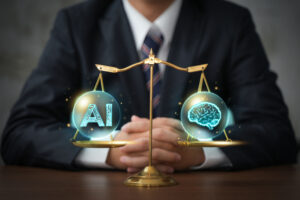Artificial intelligence is coming into the accounting world like a storm.
At Big Four accounting and consulting firms like Deloitte, AI tools are already being used to help perform accounting risk assessments on complex and lengthy contract documents. In healthcare, AI is helping accountants come to terms with mergers that smash together incompatible billing systems. The reasoning and analytical abilities of AI can work through millions of records and reduce conflicts and complexity in coding and claim processing.
Even in small firms, AI-powered customer service chatbots are helping clients find answers to common questions and perform tasks like scheduling appointments or putting together tax prep materials.
If all that is happening in the very early days of AI adoption, it’s perfectly reasonable to ask: will accounting be replaced by AI entirely?
Will Accountants Be Replaced by AI?
 It’s a big question that has a lot of small and nuanced answers.
It’s a big question that has a lot of small and nuanced answers.
But in at least one area of accounting, the answer is already pretty clear. For many of the low-level tasks of bookkeeping and office management, AI offers advantages and speed that make it a shoo-in to replace tedious and repetitive jobs.
In any area where standardized processes and procedures are already the rule, technology is usually halfway toward automating jobs anyway. Robotic process automation is a big player in major corporate ERP (Enterprise Resource Planning) and accounting systems already today.
AI techniques ranging from automated character and text recognition to advanced data science-powered financial analysis take people out of the equation when it comes to basic bookkeeping tasks like:
- Categorizing bills and invoices
- Processing supporting documentation
- Filling out and filing forms
- Producing basic financial reports
Before long, AI will become even more flexible and capable. It will be able to take on new roles in these systems that overlap with how humans currently run them. For example, while ERP systems already allow invoices to be categorized and connected to cost centers, all of that is done by humans today, even if the electronic data is automatically populated. But in the future, a generative AI could read and assess the invoice and correctly classify it without any human intervention at all.
Advantages of Artificial Intelligence in Accounting Are Driven by Speed and Expense
 The drive behind AI replacing accountants in any role will come down to quickness and costs.
The drive behind AI replacing accountants in any role will come down to quickness and costs.
Computers operate far faster than humans when it comes to processing information. So a single AI system could theoretically absorb the workload of dozens or even hundreds of accountants.
The training costs of AI aren’t cheap, however. In terms of both processing time and accumulating the large amounts of data required to train them, there are significant expenses.
Experts estimated that training GPT-3, an older LLM created by OpenAI, cost more than $4 million. Some researchers estimated that it required over a month of computation time using parallel processing clusters.
On the other hand, ongoing labor costs are typically the largest expense that any business faces. A one-time training run for a competent AI accountant that can replace all other accountants in the organization will in many cases prove to be a great deal.
Will AI Be Able To Replace CPAs and Other Advanced Accounting Positions?
 The cost advantages would be even greater considering the more high-paying positions in the accounting world. Certified Public Accountants commonly command salaries well above the nearly $80,000 average earned by accountants and auditors according to 2023 BLS (Bureau of Labor Statistics) data. That means more savings for every single one of those positions replaced with AI.
The cost advantages would be even greater considering the more high-paying positions in the accounting world. Certified Public Accountants commonly command salaries well above the nearly $80,000 average earned by accountants and auditors according to 2023 BLS (Bureau of Labor Statistics) data. That means more savings for every single one of those positions replaced with AI.
Things become more complicated when looking at more specialized and advanced kinds of accounting practice, however. As great as AI can be at shuffling papers or fielding phone calls, how will it do at analyzing complex tax scenarios or digging in to the emotional and financial entanglements inherent in estate planning?
Take a look to see if AI will replace accountants in these different advanced specialties:
Will AI Replace Tax Accountants?
 Tax accountants are a necessary annual service for pretty much every American business and nearly a third of American households. Dealing with the complexity of state and federal tax filings is a notorious headache. People are happy to pay tax accountants to handle the changing regulations, layers of potential strategies, and fine attention to detail that tax reporting requires.
Tax accountants are a necessary annual service for pretty much every American business and nearly a third of American households. Dealing with the complexity of state and federal tax filings is a notorious headache. People are happy to pay tax accountants to handle the changing regulations, layers of potential strategies, and fine attention to detail that tax reporting requires.
Can AI replace accounting jobs in this complex but important field?
There are definitely parts of tax accounting where the strengths of generative AI will come into play. For example, with reams of new regulation released every year, the ability of AI to quickly review, identify changes, and highlight the impacts on client taxes can be useful.
AI can quickly analyze various tax scenarios and make recommendations based on both current regulations and decades of accumulated data.
There’s also a lot of tedious data entry and double-checking that comes with tax accounting. AI won’t get bored or lazy when it comes to balancing out 1099s.
It also has a lot of value in performing simulations. Different tax scenarios can be quickly examined and compared to find the maximum advantage.
For the time being, however, it’s unlikely that AI will be able to do these things independently. Although it can accelerate tax accounting workflows, it won’t be replacing tax accountants just yet. Creativity and oversight will stay with humans for the foreseeable future.
Will AI Replace Management Accountants?
 Management accountants take on high-level responsibilities in companies, overseeing performance, reporting, and budgeting responsibilities.
Management accountants take on high-level responsibilities in companies, overseeing performance, reporting, and budgeting responsibilities.
At first glance, it might seem like management roles are more or less immune to AI. After all, every other wave of technology that has come through has automated only low-level, tedious jobs and given managers more strength than ever.
But AI is different. The strengths that it brings to the table almost exactly mirror what management is expected to handle:
- Communications
- Logical analysis
- Strategic planning and decision support
- Coordinating and scheduling
When AI can take in and analyze all the same data as a management accountant and find common threads and insights even faster, companies are going to ask themselves why they are paying humans top dollar for those services.
Reporting is the big area where management accountants will have to watch their backs with AI around. Data mining is already a big deal in large companies where various different data stores can be plumbed and compared for insights. AI will perform those tasks faster and with more focus on other business factors.
Will AI Replace Forensic Accountants?
 Just as it has quickly found a place in cybersecurity, AI is going to be a big deal in forensic accounting. When criminals start relying on AI to pull off fraud and financial crimes with the unique abilities that it has, the cops will have no choice but to use it to keep up with them.
Just as it has quickly found a place in cybersecurity, AI is going to be a big deal in forensic accounting. When criminals start relying on AI to pull off fraud and financial crimes with the unique abilities that it has, the cops will have no choice but to use it to keep up with them.
In forensic accounting, it’s easy to see how that works. AI can piece together a million points of data quickly and follow the money trail effortlessly. Similarly, they should also be ideal for keeping case notes, documenting evidence, and even helping to draft reports and briefs based on findings.
While they can speed up the work of forensic accountants, AI won’t be replacing them any time soon.
One edge that forensic accountants have in the fight to avoid being replaced by AI comes from the courts. The justice system is decades or more away from figuring out how to treat AI in court proceedings. Can generative chatbots be placed on the stand and subject to cross-examination? Are they a piece of evidence to be entered into the record and produced during the discovery process? And how exactly could you evaluate a statistical generative system as either evidence or witness?
So lawyers calling for expert testimony in cases where financial detail are important are going to continue to rely on forensic accountants for the foreseeable future.
Will AI Replace Financial Accountants?
 Financial accounting is the workhorse of modern corporate bookkeeping and accounting duties. Every industry needs and uses them. Most corporate accounting jobs probably fall into this category, so it’s a big question whether or not AI can fill these roles.
Financial accounting is the workhorse of modern corporate bookkeeping and accounting duties. Every industry needs and uses them. Most corporate accounting jobs probably fall into this category, so it’s a big question whether or not AI can fill these roles.
The bad news for financial accountants is that a lot of their job revolves around communicating financial information to other parts of the business. They handle data and perform analysis and offer advice on investment and financial management.
These are all things that AI should be able to handle pretty well. With a broader grasp of current data than even the smartest human, AI will be able to report more quickly, make connections between business functions and finance more readily, and make forecasts faster and more accurately. And with natural language processing powering email and report-writing, it’s pretty likely to be even more fluent than the average number-cruncher.
Will AI Replace Auditors?
 Auditing is low-hanging fruit for artificial intelligence in accounting. Uncovering patterns and detecting anomalies is already child’s play for machine learning algorithms.
Auditing is low-hanging fruit for artificial intelligence in accounting. Uncovering patterns and detecting anomalies is already child’s play for machine learning algorithms.
Big Four stalwart KPMG certainly believer that AI will completely transform the audit process. The company is already using AI to spot behavioral anomalies in transaction data, all without having to set up explicit rules for identifying issues. Instead, the AI simply learns from typical data that exists, and looks for the dog that didn’t bark.
AI can be so fast and so all-seeing that many organizations are considering going with continuous auditing or even predictive auditing. Getting ahead of regulatory compliance has powerful appeal to many companies.
On the other hand, auditing is in a similar boat to forensic accounting in that ultimately a human being may need to be looking at the books to meet ethical and regulatory standards.
No Accountant Will Be Replaced by AI Just Yet
 While the emerging capabilities of AI will pretty clearly give it the kind of capabilities that will take over many common tasks in a range of accounting positions, the key word is “emerging.” Currently, there’s nothing on the market that comes anywhere close to the range of abilities that even the most average of human accountants can count on in these roles.
While the emerging capabilities of AI will pretty clearly give it the kind of capabilities that will take over many common tasks in a range of accounting positions, the key word is “emerging.” Currently, there’s nothing on the market that comes anywhere close to the range of abilities that even the most average of human accountants can count on in these roles.
That’s because the current state-of-the-art in artificial intelligence and machine learning is based on large language models (LLMs), a kind of neural network trained on the statistical relationships between words and sentences.
That makes them great at anything to do with language, and really awful when it comes to performing the bread and butter of accounting projects: basic math.
While statistics are an important part of math, it’s impossible to do math purely with statistics. The answer to 2+2 isn’t a probability. It needs to come out at 4 every single time.
So until AI researchers find ways to teach neural networks how to combine their reasoning skills with the critical numeracy needed in the profession, accountants in every role can rest easy.
Accounting in the Future Will Still Require Strong Privacy and Ethics Standards
 Even in the longer run, there are challenges for AI accounting automation. Apart from its abilities to perform the work, there are real concerns about the use of AI revolving around two very important aspects of the accounting profession: ethics and privacy.
Even in the longer run, there are challenges for AI accounting automation. Apart from its abilities to perform the work, there are real concerns about the use of AI revolving around two very important aspects of the accounting profession: ethics and privacy.
Privacy has already become a hot-button topic in AI training. Researchers found in 2023 that ChatGPT could be promoted into disclosing private user information included in its training data. With very large volumes of information required to train these models, such disclosures could potentially expose private accounting details of millions.
Beyond the risk of having personal information shared inadvertently with other people, there’s also a risk that AI itself will uncover connections and details that are sensitive. The power of machine learning to mine different data sets and infer conclusions that humans couldn’t spot is already a concern in data science. Tying together many details that would mean nothing to another person, but could indicate a client’s sexual orientation or political preferences, is something that AI will almost certainly do.
Finally, there are significant ethical considerations in AI and accounting. Algorithms trained on historical data can pick up historical biases. Accounting has been used as a weapon against minorities, denying them credit, charging them higher interest rates, subjecting them to stricter scrutiny in audits.
While humans working in the profession can be aware of those historical biases and correct for them, AI won’t know any better unless it is trained better. And it can be far more difficult to connect the dots when it makes biased decisions. Accountants will have to be particularly careful about accepting AI judgement at face value in many situations.
How the Role for Accountants Will Evolve and Thrive in the AI Era
Rather than a competition, AI is going to offer synergies for the accounting world. It’s going to make accounting jobs easier and make accountants look better as it fills in the gaps. The real question isn’t will AI replace accounting jobs. It’s how artificial intelligence is changing accounting today.
The answer to that is a lot, and in uncertain ways. Most of AI’s impact on accounting is purely speculative right now. The fact that it will have an impact is not. Already, major accounting firms are engaged in research and experimentation to see how AI taking over accounting tasks will work.
The best way for any accountant to position themselves in this new future of accounting and artificial intelligence is through an advanced education. The machines are out there learning new things all the time. To keep up, accountants have to keep acquiring new knowledge and skills as well.







